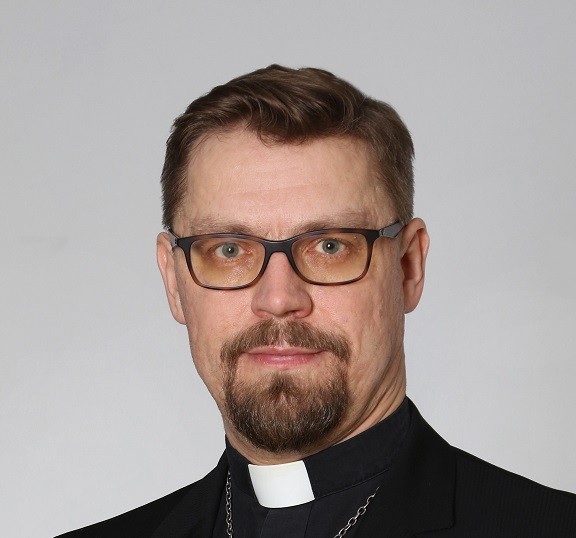Pfr. Prof. Dr. Thomas-Andreas Põder, geb. 1976 in Pärnu/Estland (damals Teil der Sowjetunion), ist zum neuen Sekretär für Theologie und Ökumenischen Dialog (Studiensekretär) der GEKE ernannt worden und trat sein Amt mit Beginn des Jahres 2022 an. Im Auftrag seiner Kirche, der Estnischen Evangelisch-Lutherischen Kirche (EELK), aber auch des Lutherischen Weltbundes und der GEKE, hat er sich seit zwanzig Jahren sowohl national als auch international an der Arbeit verschiedener theologischer Kommissionen und ökumenischer Dialoge beteiligt und zahlreiche theologische und ökumenische Dokumente entworfen und mitentworfen. Seit 2006 ist Thomas-Andreas Põder an den Tätigkeiten der GEKE beteiligt gewesen, darunter in zwei Amtsperioden als Mitglied des Rates der GEKE und bis zu seinem Dienstbeginn als Stellvertretendes Mitglied des Rates. Er hat Theologie, Philosophie und Semiotik in Tartu, Sydney und Tübingen studiert. Seine Doktorarbeit begann er bei Eberhard Jüngel in Tübingen und schloss in Greifswald bei Heinrich Assel ab. Zusätzlich zu zahlreichen Aufsätzen und fünf Bucheditionen, darunter zuletzt Sign, Method and the Sacred. New Directions in Semiotic Methodologies for the Study of Religion (DeGruyter, 2021, zusammen mit Jason Cronbach Van Boom), hat er zwei Monographien verfasst: Glaubenskultur in evangelisch-lutherischer Perspektive. Historische und konstruktive Erörterungen des theologischen Denkens (Theologisches Institut der EELK, 2018, auf Estnisch) und Solidarische Toleranz. Kreuzestheologie und Sozialethik bei Alexander von Oettingen (Vandenhoeck&Ruprecht 2016). Neben seinem Dienst als Studiensekretär der GEKE arbeitet Thomas-Andreas Põder akademisch als Lehrstuhlleiter für Systematische Theologie im Theologischen Institut der EELK und als Assoziierter Professor für Religionsphilosophie (mit Schwerpunkt Religionssemiotik) an der Universität Tartu. Er erachtet die GEKE als eine Weise des gemeinsamen Kircheseins für höchst bedeutsam und freut sich sehr in seinem neuen Dienst zum Leben dieser Kirchengemeinschaft und zur Weiterentwicklung ihrer Rolle auf der ökumenischen Landschaft beitragen zu können.
Rev. Professor Thomas-Andreas Põder, born in Pärnu/Estonia (part of the Soviet Union at the time) in 1976, became the CPCE’s new Secretary for Theology and Ecumenical Dialogue (Study Secretary) at the start of 2022. As a representative of the Estonian Evangelical Lutheran Church (EELC), but also the Lutheran World Federation and the CPCE, he has been involved in the work of various national and international theological committees and ecumenical dialogues for twenty years and has drafted or co-drafted numerous theological and ecumenical documents. Prof. Põder has participated in the CPCE’s activities since 2006, serving as a member of Council for two terms of office and as a proxy Council member until his recent appointment as a member of staff. He studied theology, philosophy and semiotics in Tartu, Sydney and Tübingen. He started work on his doctoral thesis under Eberhard Jüngel in Tübingen, completing it under Heinrich Assel in Greifswald. In addition to numerous articles and five edited books, most recently Sign, Method and the Sacred. New Directions in Semiotic Methodologies for the Study of Religion (DeGruyter, 2021, together with Jason Cronbach Van Boom), he has written two monographs: The Culture of Faith in Lutheran Perspective. Historical and Constructive Explorations in Theological Thought (Theological Institute of the EELC 2018, in Estonian) and Solidarische Toleranz. Kreuzestheologie und Sozialethik bei Alexander von Oettingen (Vandenhoeck&Ruprecht 2016). Beside his new role of Study Secretary in the CPCE, he works as Head of the Chair of Systematic Theology at the Theological Institute of the EELC and as Associate Professor of Philosophy of Religion (with special focus on semiotics of religion) at the University of Tartu. He considers the CPCE as a highly significant mode of being church together, and is greatly looking forward in his new line of service to the chance to contribute to the life of this church communion and further develop its role in the ecumenical landscape.
